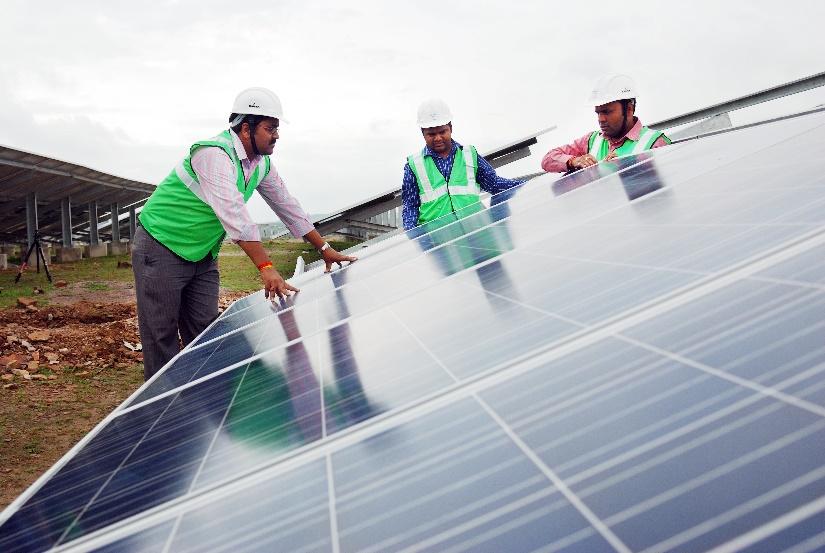Solar energy isn’t just transforming the way we power our homes — it’s transforming economies. Beyond its environmental benefits, solar power has become a major driver of job creation, innovation, and economic growth worldwide. From manufacturing and installation to maintenance and research, every solar project contributes to a stronger, more sustainable economy.
The Rise of the Solar Industry:
Over the past decade, solar power has grown from a niche technology into one of the fastest-growing sectors in the global energy market. Governments, businesses, and households are rapidly adopting solar systems as costs continue to fall and efficiency rises.
This surge in demand has led to a massive expansion of the solar workforce — engineers, electricians, designers, project managers, marketing teams, and maintenance specialists are all in demand. According to industry reports, the global solar workforce has grown by hundreds of thousands of jobs every year, and this trend shows no sign of slowing down.
Job Creation Across Multiple Sectors:
One of the best things about solar energy is that it creates diverse job opportunities across different skill levels and industries.
• Manufacturing Jobs: Solar panels, inverters, batteries, and other components are produced in factories worldwide. Every manufacturing facility supports engineers, technicians, and quality control specialists.
• Installation and Construction Jobs: Installing solar systems requires skilled electricians, installers, and construction crews — creating thousands of local jobs.
• Sales and Marketing: As more people explore solar options, sales teams and marketing professionals are needed to educate customers and close deals.
• Research and Development: Engineers and scientists continue to improve solar cell efficiency, storage technology, and integration systems.
• Operations and Maintenance: Once systems are installed, regular cleaning, inspections, and upgrades generate long-term service jobs.
From rural areas to major cities, solar energy provides employment that can’t easily be outsourced — it benefits local economies directly.
Boosting Local and National Economies:
Every solar installation contributes to economic growth. Here’s how:
• Local Spending: Solar companies often buy materials, hire labor, and pay taxes within their communities, putting money back into local economies.
• Energy Savings: Businesses and homeowners who go solar save on electricity bills, freeing up money for other expenses or investments.
• Reduced Energy Imports: Countries that invest in solar energy reduce their dependence on imported fossil fuels, keeping billions of dollars within their national economy.
• New Business Opportunities: Solar development drives innovation in related fields like battery storage, smart grids, and electric vehicles — further expanding the clean-energy market.
The solar industry doesn’t just create jobs; it builds entire economic ecosystems around renewable energy.
Rural Development and Energy Access:
In developing nations, solar energy has become a lifeline for rural communities. Off-grid solar systems provide electricity to remote areas where extending the grid is costly or impossible.
This electrification enables small businesses to grow, improves education and healthcare facilities, and creates micro-enterprises like solar water pumps or charging stations. By improving productivity and income opportunities, solar energy directly lifts communities out of poverty — driving both social and economic development.
Encouraging Investment and Innovation:
The solar sector attracts massive private and public investments. As governments promote green energy policies and companies adopt sustainability goals, investors are pouring capital into solar manufacturing, R&D, and startups.
This competition and innovation lead to technological breakthroughs, lower costs, and more efficient systems — creating a positive economic cycle. The more solar grows, the cheaper it gets, which in turn fuels even greater adoption and job creation.
A Path Toward a Sustainable Future:
Unlike fossil fuels, solar power creates jobs without damaging the environment. Workers in the solar sector contribute to clean energy production that reduces pollution, combats climate change, and builds long-term economic resilience.
As more countries commit to net-zero targets, solar energy will play a central role in creating millions of green jobs — ensuring future generations enjoy both a healthier planet and stronger economies.
Conclusion:
Solar energy is more than a source of clean electricity — it’s a powerful engine for economic growth. From manufacturing and installation to innovation and maintenance, the solar industry supports a wide range of professions and helps build sustainable economies.
Every rooftop solar panel, every megawatt of solar farm capacity, and every technological advancement translates into new jobs, stronger communities, and a brighter economic future.
As the world continues its shift toward renewable energy, investing in solar means investing in people, progress, and prosperity.




